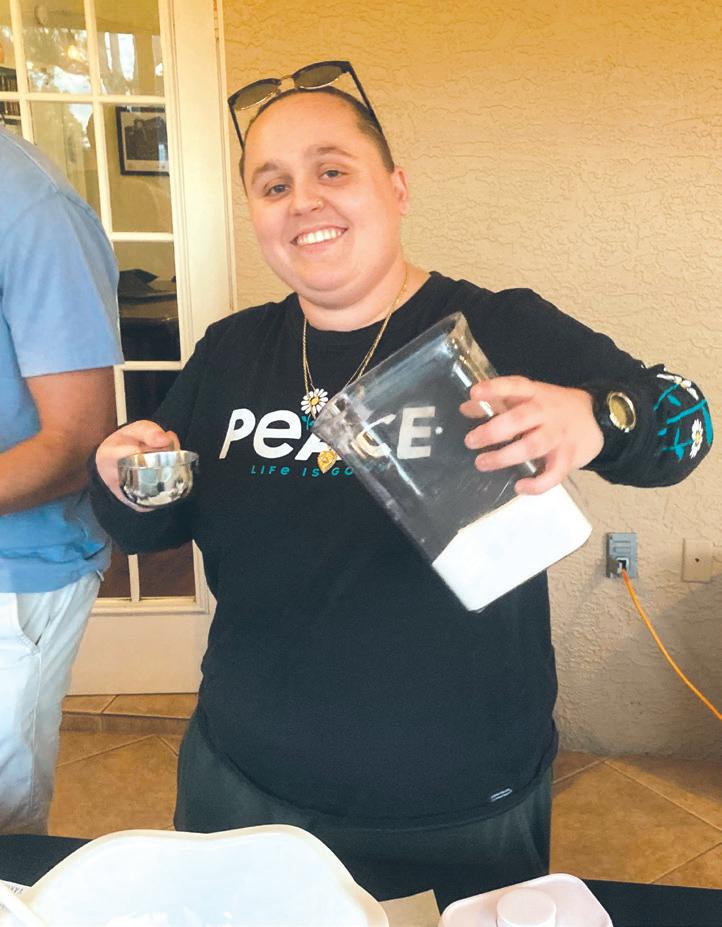
5 minute read
If it’s Pysec’h, spring can’t be far behind!
The Yiddish corner
By Sol Awend, GenShoah SWFL
If Purim just passed, Passover is exactly a month away. You know what that means — spring is just around the corner.
By us Jews, it’s a most important time of the year, for, without Passover, we never would have gotten a calendar. The first Law that was created said that the Israelites should have their own way of marking time.
So, on the Jewish calendar’s 14th of Nissan, we usher in the Holiday marking our birth as a Nation. Over the ages, customs surrounding Pesach have been woven into our framework of being Jews; food being near the top of the list.
Coming home from school, you’d probably find your Mom or Babeh gleefully cooking in the kitchen, creating delights that still muster up wonderful memories, no? Nah! Faa zee ec’h! Here! Taste!
Starting off our trip for this month are words and phrases associated with Passover, the earth-shattering event that started our belief system.
Pysec’h
Pronunciation: PY-sec’h
Meaning: Passover. In Hebrew school, you learned it as Peh-saac’h. If you were European, you remember it being called Py-sec’h. Because the Hebrew and English calendars are different, the question was always…
In a sentence: Venn kimp’t Paysec’h, freeyeh odeh shpayteh? (When does Passover occur, early or late?)
Deh si-deh tish
Pronunciation: deh SI-deh TISH
Meaning: The seder table, in all its glory, with a beautiful dinner table set and complete with the Holiday symbols.
In a sentence: Zay no vee shein deh Seideh Tish zay’t oss! (Look how beautiful the seder table looks!)
Hagoodeh
Pronunciation: ha-GOO-deh
Meaning: You probably know it as the Haggadah, and it’s the action-packed story of the Jewish people. The long and winding story is told through commentary and customs, one of which you’d better know.
In a sentence: Nem dee Hagoodeh un mish off Dee Feeyeh Kashes! (Take the Hagadah and find the four questions!)
Bentsh lic’ht
Pronunciation: BEN-sh LIC’HT
Meaning: This is where your Mom or Babeh would light the candles commemorating the start of the holiday. The table set, alles fah pits’t, everything polished.
In a sentence: Alles shaa-shtill, Deh Mameh bensh’t Dee Lic’ht. (In silence, Mom blesses the (holiday) candles.)
Kiddish
Pronunciation: KIDD—ish
Meaning: Reciting the prayer over the wine
In a sentence: Deh Taateh ot geh maac’ht Kiddish. (Dad performed the act of saying Kiddish.) Flayeh er hawt oogeh hoyben, ot men nisht geh hayet a voret. (Before he started, not a word was heard.)
Deh feeyeh kaashes
Pronunciation: deh FEE-yeh KA-shes
Meaning: The four questions. If you were the ying-steh, the youngest, well, it was showtime.
In a sentence: Kim ah hayeh, lomeh heren vee dee zoogs’t Deh Fee-yeh Kaashes! (Come over here, let’s hear how you say the four questions!) You would be standing next to your dad, looking at one another, as was everyone else around the table. Failure was not an option.
Dee t’zain maahkes
Pronunciation: dee T”ZAIN mahkes
Meaning: The ten plagues.
In a sentence: It’s right about now, dipping your finger into the wine that you … Fah c’haazeh daim vaasen tish tec’h miit’n vaan. (You stain the white tablecloth with wine.) Like that first dent in a new car, it’s all downhill from there.
K’nyd’l/k’neidlec’h
Pronunciation: KE-ny-del/KE-nyd-lec’h
Meaning: Matzo ball, singular; Matzo balls, plural. If they were made right, they’d be floating to the surface of the boiling water and be light as air in your soup bowl.
In a sentence: Zay no vee shein dee k’nydlec’h ob’n zrc’h o geh koc’ht! (Look how nicely the matzo balls were cooked!)
Yowec’h
Pronunciation: YO-wec’h
Meaning: Chicken soup. It’s not always used to heal the sick and makes the start of any meal an uplifting experience; especially if …
In a sentence: Deh yowec’h hot oygen! ( The soup has eyes!) It’s those round globules of fat floating on the surface of the soup that adds to the character of the k’neidlec’h.
Myren
Pronunciation: MY-ren
Meaning: Carrots. They were the key ingredient in the t’zimmess, a traditional Ashkenazi Jewish stew typically made from carrots and dried fruits such as prunes. From experience, you know to load up on this.
In a sentence: Deh t’zimmess iz zayeh geh shmaack! ( The t’zimmess is delicious!)
Geh feelteh fish mit c’hein
Pronunciation: geh-FEEL-teh sh mit C’HEIN
Meaning: Gefilte fish with horse radish
It can also be pronounced as C’hrayn. Same explosive character and comes in regular or red; good for spilling on the tablecloth. If done right, it’ll bring tears to your eyes and make you breathe normal in no time.
In a sentence: Geb ah hayeh ah shtik’l geh feelteh fish. Tee arof ah bissel c’hein! (Pass a piece of gefilte fish. Put some horseradish on top of it!)
Oogeh praygelteh matza braan
Pronunciation: OO-geh PRAY-gel-teh MAH-tzeh BRAAN
Meaning: Fried Matzo
This delicacy is one for which you wait the whole year. Depending on your background, you can add a variety of toppings. Growing up, we only used sugar, while many used sour cream and jelly. I must admit it could be a contender for the breakfast of champions. That and a glayzel tei mit t’zikeh un t’zeh treen (a glass of tea with sugar and lemon) — what a way to say hello to springtime!
In a sentence: Hob ah freilic’hen Pysec’h! (Have a joyous Passover!)







